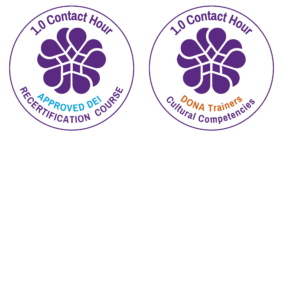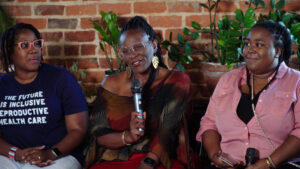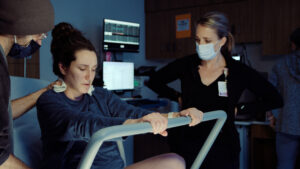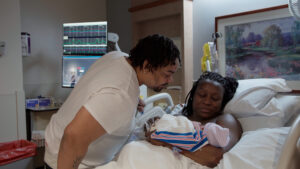
Day 2
Tuesday, October 29th, 2024
Welcome
Tue, Oct 29 at 10:00 am EDT
Welcome and Keynote: Perinatal Health Equity for Indigenous People in the United States
Overview
*This sessions is being offered free for DONA Members in honor of Native American Heritage Month until 11/30/24*
American Indian/Alaska Native birthing people in the United States face profound inequities during and around the time of childbirth. This has long been true and continues to be true, with headline after headline indicating loss of maternity services in rural and tribal communities, workforce shortages, financial challenges, and safety concerns. These and other challenges result in growing disparities in maternal morbidity and mortality, with American Indian/Alaska Native people being at least 3 times more likely to die from a pregnancy-related cause than white people.
Dr. Kozhimannil will discuss these and other barriers to safe and healthy birth for Indigenous people through examination of historical and contemporary factors that shape these inequities. She will also lead participants in looking forward by discussing clinical, public health, and policy efforts that may decrease maternal mortality and improve equity for Indigenous people, including through highlighting positive changes already happening in Indigenous communities across the country.
This session is sponsored by:


Provider approved by the California Board of Registered Nursing, Provider #17981, for 1.00 Contact Hours. Licensee must retain this document for a period of four years after the course concludes.
Speaker(s)
Dr. Katy Backes Kozhimannil, PhD, MPA
Break
Concurrent Sessions - Please Pick One
Tue, Oct 29 at 11:30 am EDT
Birth and Postpartum Plans: Changing the Point of View
Overview
Traditional birth and postpartum plans tend to focus on the available obstetric programs. However, aren’t there additional considerations beyond these options? People who have undergone previous negative experiences, particularly within medical contexts, commonly face fear and distrust, and adopt avoidance strategies. Do they feel that their experiences and needs are adequately recognized and catered to within the traditional plan?
At the same time, establishing trust between parents and medical professionals is crucial for emotional well-being during childbirth and the postpartum period. Nevertheless, there is often a lack of individual coping strategies and the ability to build a positive relationship with medical staff. An individualized birth and postpartum plan can facilitate the communication of key needs and coping strategies, as well as create a welcoming and trusting atmosphere with the care team. In this session, international speaker, Zuzana Laubmann will take us through essential elements of birth and postpartum planning to bring harmony and openness to foster connections within the plan.
Speaker(s)
Zuzana Laubmann, Mgr., MA, HPP, CD(DiD)
Tue, Oct 29 at 11:30 am EDT
Amplifying Support: Caring for Families After Pregnancy Loss and Proactively Addressing Prevention
Overview
Approximately 1/4 pregnant people will experience pregnancy loss and 1/170 pregnancies on average each year end in stillbirth. The stillbirth rate in the US has been stagnant for some time and this is in part due to a lack of efforts at stillbirth prevention due to the fatalistic belief that stillbirth cannot be prevented. A 2018 ACOG article, “Potentially Preventable Stillbirth in a Diverse US Cohort” found that 25% of all stillbirths and 47% at term may be potentially preventable. Black parents are 2-3 times more likely to experience stillbirth than other races. This a health disparity that must be addressed.
Currently, there is no formal teaching for residents, CNM, or medical students about the care of loss families. Doulas are on the front line of emotional care for our patients and some simple tips can help provide bereavement care for patients experiencing pregnancy loss. In this presentation, Dr. Heather Florescue and Dr. Lindsey Wimmer will discuss stillbirth and its causes. They will explore ways that doulas can be at the frontline of prevention by educating their clients and encouraging advocacy when their clients believe that something is wrong and will discuss the care of loss families including ways to improve care and help with the grieving process.
Speaker(s)
Dr. Heather Florescue, MD, FACOG, Co-Presenter
Dr. Lindsey Wimmer, DNP, CPNP, RN, PHN, Co-Presenter
Tue, Oct 29 at 11:30 am EDT
Sharing Experiences As a Doula: Whether, When, and How to Talk About What It Was Like For You
Overview
Have you ever wanted to say, “ME TOO!”, or “That’s NOT how it happened to me!”, to a client? Doulas often approach births with experience – as a hopeful parent, as a birthing person, or as a doula at other births. Sharing these background experiences with clients or potential clients can sometimes create problems or difficulties by centering the conversation on the doula, sometimes even changing the direction of care. However, sometimes, sharing these experiences can create opportunities for clients to feel less alone. In this session, sociologist Dr. Abby Jorgensen will discuss some guiding principles for determining whether to share your own experience, especially in very difficult situations of bereavement and trauma. She will also provide tips for sharing in the healthiest and most honorable way possible, when appropriate. Join Dr. Abby as we discuss ways to engage with our own stories while playing a role in those of others.
Speaker(s)
Dr. Abigail Jorgensen, Ph.D., CD(DONA), LCCE, HCBD
Tue, Oct 29 at 11:30 am EDT
To Incorporate Or Not? Best Options for Your Doula Business
Overview
When deciding which type of business structure is right for your existing or new US-based doula business, you may have many questions. Determining what is best is dependent on many factors, including your business size, whether you intend to have any employees, and what your financial situation looks like at this time. In this session, we will examine the differences between a sole proprietorship and a corporation and highlight the pros and cons of each structure. Additionally, we explore the various corporation types that exist and the benefits of those business formations.
Speaker(s)
Gary Romano, SHRM-SCP
Break
Film Screening and Panel Discussion
Tue, Oct 29 at 12:45 pm EDT
Bloom Documentary Film Screening and Conversation
Overview
Join three expectant parents and their doulas in “Bloom,” a documentary film journey toward safe, confident childbirth. Explore the vital role doulas play in bridging medical gaps, offering educated advocacy that safeguards against trauma and can be life-saving, especially for BIPOC birthing parents. In a climate of challenging reproductive care, “Bloom” celebrates those transforming healthcare, making it accessible and positive.
This session is sponsored by:

Watch the Trailer
Following the film screening, ShLanda Burton, the film’s executive producer, and DONA Advanced Certified Doula, will lead a conversation about the critical work of education and advocacy in the birth space. The film directors will also be in attendance and will take some questions from attendees!



Speaker(s)
ShLanda Burton, B.S., NDTR, AdvCD(DONA),Executive Producer, Panel Speaker
Elizabeth Miller-Derstine, MFA Documentary Film, Panel Speaker
Allison Rieff, MFA Documentary Film, Panel Speaker
Virtual Exhibit Hall
Concurrent Sessions - Please Pick One
Tue, Oct 29 at 2:45 pm EDT
A No-Fail Recipe for Creating and Sending Newsletters to Amplify Your Doula Business
Overview
There are many proven ways to grow your birth or postpartum business. But let’s be honest, if you do not enjoy a particular method, or find it difficult and time-consuming, it just isn’t going to happen, no matter how much you know you should. The key is to find a method for reliably marketing your perinatal business that is easy and fool-proof for you. In this practical session, doulas are invited to apply a simple “no-fail recipe” for creating an effective newsletter that promotes their perinatal business and requires minimal effort with maximum return.
In this session, Sharon Muza shares a simple formula for putting it all together, tons of topic ideas and suggestions for how to collaborate with others to create exciting content that you all can use. Additionally, learn how AI can even automate some of this work. This is your opportunity to turn this oft-dreaded task into a quick, streamlined monthly process that maximizes the investment of your time and energy. Through engaging and interactive learning, you will gain confidence and skills so that your newsletter positions you as the perinatal expert you are and expands your earning potential! Let’s get cooking!
Speaker(s)
Sharon Muza, BS, CD/BDT(DONA), LCCE, FACCE, CLE
Tue, Oct 29 at 2:45 pm EDT
Supporting Queer Families in the Perinatal Period: Moving from Tolerance to Cultural Humility
Overview
This workshop will provide participants with a deeper understanding of the range of LGBTQIA2S+ identities, families, language, and potential needs during the perinatal period, with a lens towards the right of folks to self-identify. Through small group discussion, lecture, and learning exercises participants will be given the opportunity to examine their own learned biases, how they impact the work, and steps towards change.

Speaker(s)
Rachel Hess, CPD, MS
Tue, Oct 29 at 2:45 pm EDT
Unconditional Positive Regard: Harm Reduction Approach to Doula Work
Overview
Explore the vital role of doulas in supporting pregnant families with drug use or a history of drug use. Drawing from experience in Philadelphia, doula, MaryNissi Lemon will highlight the importance of unconditional positive regard, holistic care, and trust in empowering expectant parents. The session will explore unconditional positive regard in doula care, embracing holistic support beyond drug use, and cultivating trust in individuals’ decision-making.
Central to this discussion is the concept of coming to space believing that people are inherently good; addressing the whole person rather than solely focusing on drug use, and, most importantly, trusting a person’s capacity to choose what is best for them based on their unique circumstances. Join this session to discuss transformative approaches to doula support in challenging contexts, essential for navigating pregnancy and birth within communities affected by drug use.

Speaker(s)
MaryNissi Lemon, CD(DONA), CLC, Childbirth Educator
Break
Keynote
Tue, Oct 29 at 4:00 pm EDT
Keynote: Creating Neurospicy Birth Spaces: Amplifying Equity for the Neurodivergent Population and Day 2 Closing
Overview
Doulas can play a transformative role in supporting their neurodivergent clients by forming strong relationships and creating an optimal birth space. By recognizing and respecting the concept of neurodiversity, doulas can ensure that each client’s distinctive needs are met and treated with dignity and value, resulting in a more positive and empowering birth experience. Using simple yet effective tools, a doula can help transform the birthing environment from a place of fear and anxiety to one of calmness and anticipation.
In this session, doula Takiesha Smith will lead us through a discussion about the various types of neurodivergent clients as well as offer tools for doulas to help create and navigate a neurodivergent birth space.

Speaker(s)
TaKiesha Smith, CD(DONA), CLC, CCHW
Day 2 Closing
Closing-Founders Awards-DONA Nobis Pacem
Join DONA 2024 President, Robin Elise Weiss as she closes the 2024 DONA Summit. She’ll award this year’s founders awards and video of the late Penny Simkin leading us in the traditional closing circle and singing of DONA Nobis Pacem. With a special treat, we share video footage of Penny speaking about the song and what it meant to her.
| Access Date | Quiz Result | Score | Actions |
|---|
Registrant Login
Schedule at a Glance
Technical Support
Please visit our FAQs page.
Need further assistance? Email our technical support team using the appropriate link below.
Optimal Browser Note
For optimal use, please use Mozilla Firefox or Google Chrome. Internet Explorer 11 is not compatible with this virtual platform.

